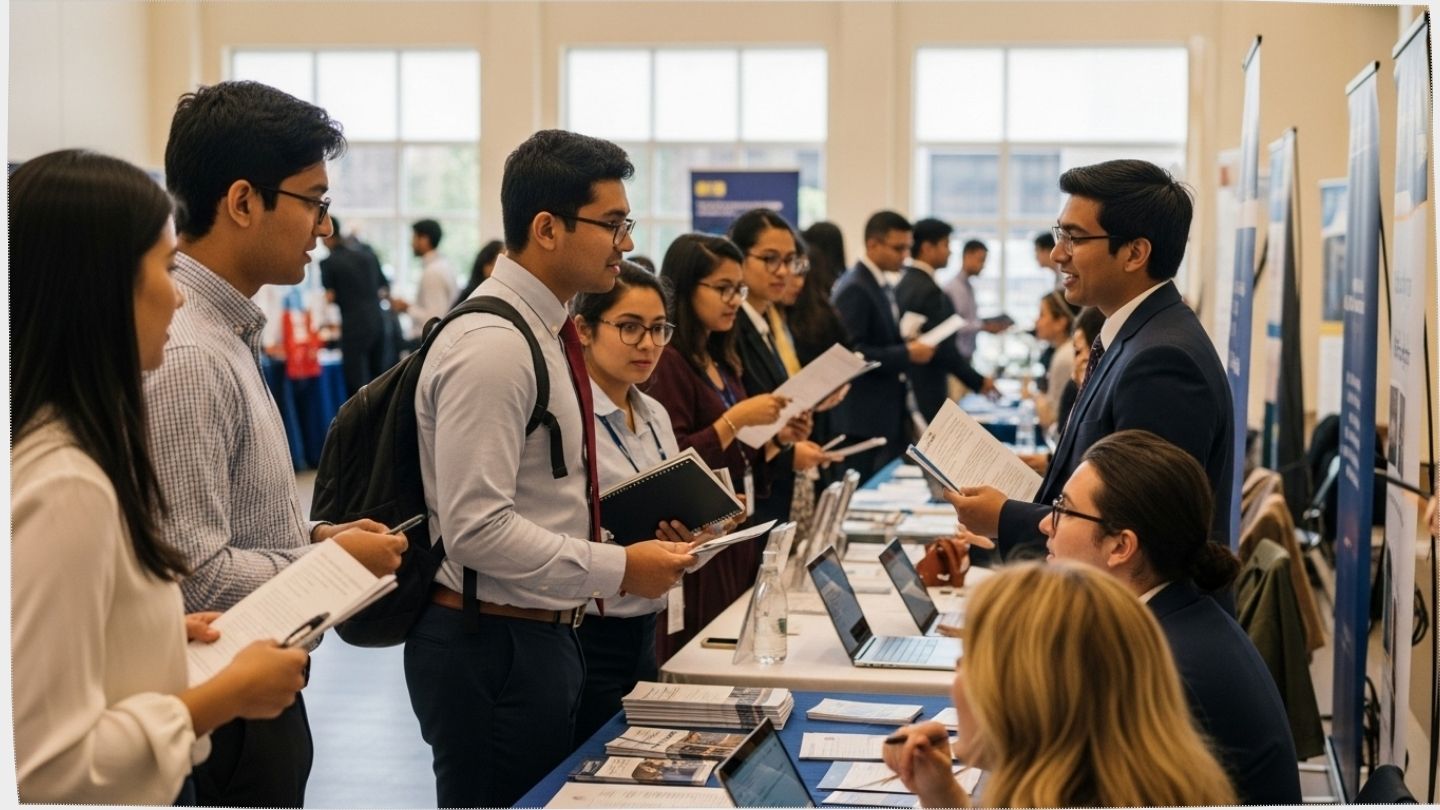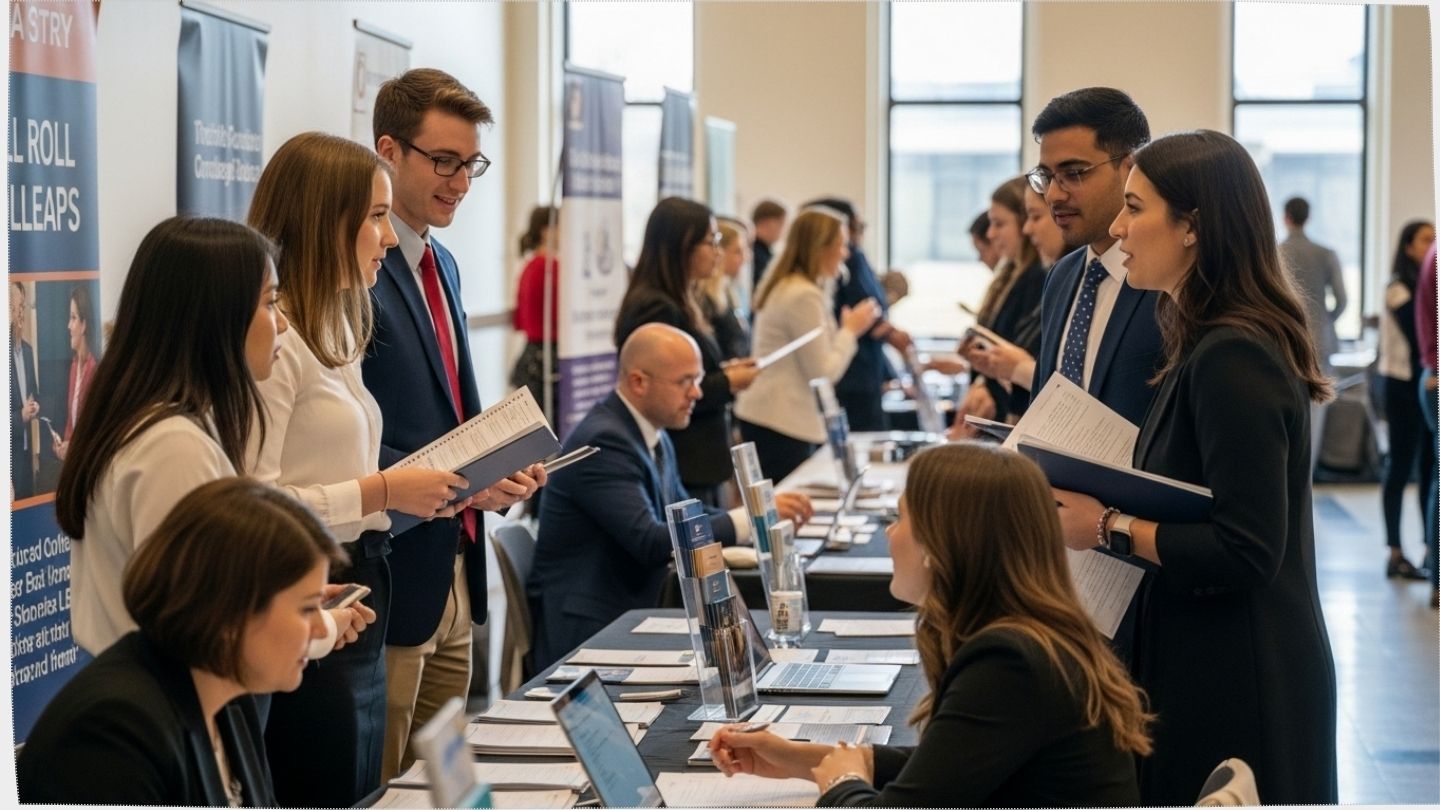
Why Career Events Matter For Students
Many students enter college with a clear class schedule but a hazy picture of life after graduation. They hear about “jobs” and “careers” yet struggle to link a subject like economics, physics, nursing, or literature with actual roles and workplaces.
Surveys from bodies such as the National Association of Colleges and Employers (NACE) describe a pattern that feels familiar on many campuses: employers want graduates who can communicate, solve problems, work in teams, and act professionally, and students are unsure how well they meet those expectations. Career fairs and workshops sit right in this gap. They give students a chance to talk with employers, ask direct questions, and practise presenting themselves as future professionals, not only as exam candidates.
For students from low-income families, rural areas, or first-generation backgrounds, these events can matter even more. They may not have relatives who work in large organisations, or friends who can explain how graduate recruitment usually works. A few conversations at a fair or in a workshop can replace guesswork with concrete information and small, manageable next steps.
What Happens At A College Career Fair
Common Formats
On many campuses, a career fair means a large room with stalls and banners. Modern fairs, however, show a mix of formats:
-
General fairs with employers from a wide range of sectors
-
Sector-specific events for fields such as health, engineering, IT, social work, or hospitality
-
Smaller fairs focused on internships or part-time roles
-
Online or hybrid fairs that use video calls and chat for students who cannot attend in person
Regardless of format, the core idea stays the same: bring students and employers into the same space for face-to-face conversation. Research on campus recruiting shows that plenty of interviews and offers still begin with a short interaction at a fair. A student asks a genuine question, an employer sees interest and potential, and the conversation continues later through email or a formal application.
Who Takes Part
Three main groups shape the event:
-
Students looking for guidance, work experience, or full-time roles
-
Employers wanting to meet possible recruits and share information about their sector
-
Career staff and faculty who organise the fair and link it with teaching
When the event works well, each group gains something useful. Students gather insight and contacts, employers find motivated candidates, and colleges learn how programmes connect with current labour market needs.

Types Of Career Workshops Students Find Helpful
Skill-Building Workshops
Many colleges run workshops on practical career skills that rarely fit into standard lectures. Common topics include:
-
Writing resumes and cover letters
-
Preparing professional profiles and portfolios
-
Practising interviews and group discussions
-
Communicating with employers through email and short introductory talks
Studies on career courses report that students who attend well-structured sessions often feel more confident about applications and interviews. They know how to talk about their projects, part-time work, and volunteer roles in a clear way. They also learn how to read job adverts with a more critical eye, spotting the key skills and values that appear again and again.
Exploration And Reflection Workshops
Other workshops focus on career exploration rather than recruitment. In these sessions, students might:
-
Reflect on interests, strengths, and preferred environments
-
Map degree subjects to different occupational areas
-
Examine labour market information on growth sectors and typical entry routes
Career development research in higher education suggests that reflection combined with credible labour market data tends to support stronger, more realistic plans. When students see how their subject links with several possible paths, anxiety often eases and curiosity grows.
Focused Support For At-Risk Students
Some institutions create short programmes for students at risk of dropping out. A well-known example involved a series of workshops for first-year students with low academic standing. After the programme, participants reported clearer career goals, better knowledge of options, and stronger determination to stay in college, even though their stated academic motivation had not changed much. That shift in purpose helped many of them hang on during difficult semesters.
How Career Fairs And Workshops Shape Career Choices
From Vague Ideas To Real Options
Large international surveys, including work linked to the PISA studies, show that young people who engage with career activities such as fairs, workplace visits, and guidance sessions often hold more focused views of their future. They can name specific roles and fields, not only broad labels like “business” or “engineering”.
A fair gives a student a quick overview of many roles in a single day. For example, a student who loves biology might discover roles in public health, food safety, medical sales, and environmental consulting. That wider view helps when choosing electives, final-year projects, or postgraduate plans.
Building Social Capital
Career fairs and workshops also build social capital: networks of contacts that open doors. Research on employer engagement in higher education shows that regular contact with employers and alumni improves access to information about hiring, culture, and skills in demand.
For a student with no professional contacts at home, one short chat with an alum or recruiter can make a difference. They now have a name, an email address, and a clearer sense of what daily work looks like. If they handle follow-up carefully, that first contact may grow into mentoring, an internship, or a graduate role.
Links With Academic Engagement And Wellbeing
Why Career Focus Helps Students Stay
Many students question their course choice at some point. When they cannot picture a future that uses what they are learning, motivation often drops. Research on career interventions suggests that students who gain clearer career plans tend to report lower distress and less indecision.
Workshops and fairs contribute here by answering a simple yet powerful question: “What is this degree for?” Once a student sees a handful of real paths that connect to their subject, assignments and exams feel more purposeful. The work still takes effort, yet it now leads somewhere that makes sense.
Confidence As A Protective Factor
Career education also supports wellbeing through confidence. A student who believes they can gather information, approach employers, and learn selection skills step by step feels less helpless than one who views recruitment as a mysterious test. That sense of agency can soften stress around graduation and help students seek support early rather than freeze.
What Employers And Colleges Gain
Employer Perspective
Employers use campus events to:
-
Meet many potential candidates efficiently
-
Observe communication and interpersonal skills in an informal setting
-
Share accurate information about roles, culture, and growth paths
-
Gather feedback on how students perceive their organisation
Surveys of employers involved in campus activity show that many value long-term partnerships. They return year after year, offer guest talks, and co-design projects with faculty. Over time, this steady contact helps employers refine their recruitment and helps students understand what different organisations expect.
College Perspective
For colleges and universities, career fairs and workshops serve as a live feedback system. Staff can see which employers visit, which fields attract long queues, and where students seem confused. Follow-up data from these events helps answer questions such as:
-
Which programmes send students to fairs and workshops more often?
-
Which sessions link most strongly with internships and graduate roles?
-
Where do students say they still lack confidence or clarity?
Answers to these questions feed into curriculum reviews, new partnership ideas, and cases for extra support from leadership.
Design Tips For Strong Career Fairs
Clear Aims
Effective fairs start with a simple statement of purpose. An event aimed at first-year exploration will look different from one focused on final-year recruitment. If the goal centres on early exposure, organisers might limit heavy selection activity and instead highlight informal conversations and short talks. If the aim sits closer to hiring, the structure can include interview rooms, CV checks, and more targeted employer lists.
Preparation And Follow-Up
Preparation sessions help students get far more value from a fair. Short workshops on introductions, resume basics, and question planning often change the mood from fear to curiosity. After the event, reflection sessions and one-to-one guidance help students turn scattered impressions into a clear plan.
Without this before-and-after support, many students simply wander through the hall, collect brochures, and go home unsure of what to do next.
Design Tips For Meaningful Workshops
Link With Subjects
Career workshops work best when they connect with what students study. Examples include:
-
Embedding a resume exercise into a business communication class
-
Linking a group project in engineering with a debrief on teamwork skills valued by employers
-
Building a reflective task in social science subjects where students connect theories with community roles
This approach sends a strong message: career thinking belongs inside the classroom, not only in a separate office down the corridor.
Active And Practical
Students gain more from workshops that ask them to write, speak, role-play, and critique than from long lectures about “careers”. Sessions that end with a tangible product—a revised resume, a list of target organisations, a written action plan—tend to stick in memory and support future action.
Digital And Hybrid Career Events
During the pandemic, many institutions shifted career fairs and workshops online. NACE benchmark reports suggest that in-person events still hold a special place for employers and students, yet online formats now sit firmly in the mix.
Online events can:
-
Reach students who live far from campus or work long hours
-
Bring in employers who cannot travel
-
Provide recordings that students can revisit later
Hybrid models that pair on-campus activity with online follow-up give students more choice about how they engage. A student might attend a fair briefly between classes, then join a deeper virtual session with a particular employer in the evening.
Practical Advice For Students
Before An Event
-
Clarify your goal: exploration, internship search, or graduate role.
-
Read the list of sessions or employers in advance and pick a short priority list.
-
Prepare one short introduction that feels natural when you say it aloud.
-
Write down three questions you genuinely want to ask.
During And After
-
Start with one stall or session to warm up; you do not need to cover the whole hall.
-
Take short notes after each conversation so names and insights stay fresh.
-
Send brief follow-up messages where appropriate.
-
Decide on one clear action within a week: apply, book an advising session, start a skills course, or explore a new field in more depth.
Small, steady steps matter more than trying to “fix” your career plan in a single day.
Practical Advice For Colleges
Colleges that gain strong results from career fairs and workshops tend to treat them as part of a longer pathway, not as one-off events. Helpful moves include:
-
Creating a simple framework that links career learning across all years
-
Involving faculty in event design and follow-up tasks
-
Inviting alumni who graduated recently and remember the same classrooms
-
Tracking participation, satisfaction, and related outcomes over several years
This long view helps teams spot patterns, address gaps, and invest where impact appears strongest.
Ethics And Inclusion In Career Support
Career events carry real influence, so they need an ethical base. Honest communication about labour market conditions, competition, and starting salaries matters. So does a commitment to inclusion. That commitment can appear through:
-
Accessible venues and online options
-
Clear guidance for international students on local recruitment norms
-
Employer lists that include smaller organisations, not only famous names
-
Careful attention to language and imagery so that all students see themselves as welcome
When students feel seen, respected, and told the truth, career fairs and workshops become more than busy days on the calendar. They grow into steady supports that help young adults move from college corridors into working life with clearer minds and steadier steps.
College Education

